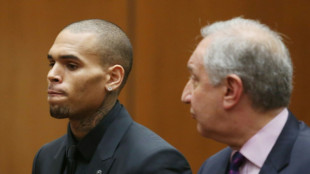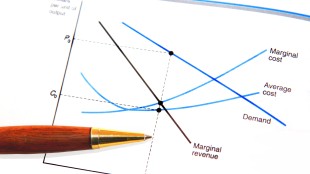
-
 US falling behind on wind power, think tank warns
US falling behind on wind power, think tank warns
-
US news giant CNN eyes 200 job cuts, streaming overhaul

-
 Rubio chooses Central America for first trip amid Panama Canal pressure
Rubio chooses Central America for first trip amid Panama Canal pressure
-
Wall Street's AI-fuelled rally falters, oil slumps

-
 Trump tells Davos elites: produce in US or pay tariffs
Trump tells Davos elites: produce in US or pay tariffs
-
Progressive politics and nepo 'babies': five Oscar takeaways

-
 American Airlines shares fall on lackluster 2025 profit outlook
American Airlines shares fall on lackluster 2025 profit outlook
-
France to introduce new sex education guidelines in schools

-
 Wall Street's AI-fuelled rally falters
Wall Street's AI-fuelled rally falters
-
Drinking water in many French cities contaminated: study

-
 After Musk gesture, activists project 'Heil' on Tesla plant
After Musk gesture, activists project 'Heil' on Tesla plant
-
ICC prosecutor seeks arrest of Taliban leaders over persecution of women

-
 Syria's economy reborn after being freed from Assad
Syria's economy reborn after being freed from Assad
-
Shoppers unaware as Roman tower lurks under French supermarket

-
 Stocks mainly rise after Wall Street's AI-fuelled rally
Stocks mainly rise after Wall Street's AI-fuelled rally
-
Singer Chris Brown sues Warner Bros for $500 mn over documentary

-
 J-pop star Nakai to retire after sexual misconduct allegations
J-pop star Nakai to retire after sexual misconduct allegations
-
Leaky, crowded and hot: Louvre boss slams her own museum

-
 WWF blasts Sweden, Finland over logging practices
WWF blasts Sweden, Finland over logging practices
-
How things stand in China-US trade tensions with Trump 2.0

-
 Most Asian markets rise after Wall Street's AI-fuelled rally
Most Asian markets rise after Wall Street's AI-fuelled rally
-
Fire-hit Hollywood awaits Oscar nominees, with 'Emilia Perez' in front

-
 New rider in town: Somalia's first woman equestrian turns heads
New rider in town: Somalia's first woman equestrian turns heads
-
Most Asian markets extend AI-fuelled rally

-
 Bangladesh student revolutionaries' dreams dented by joblessness
Bangladesh student revolutionaries' dreams dented by joblessness
-
Larry Ellison, tech's original maverick, makes Trump era return

-
 Political crisis hits South Korea growth: central bank
Political crisis hits South Korea growth: central bank
-
Photonis Launches Two Market-Leading Solutions to Advance Single Photon Detection and Imaging Applications

-
 Les Paul owned by guitar god Jeff Beck auctioned for over £1 mn
Les Paul owned by guitar god Jeff Beck auctioned for over £1 mn
-
Musk bashes Trump-backed AI mega project

-
 Does China control the Panama Canal, as Trump claims?
Does China control the Panama Canal, as Trump claims?
-
Yemen's Huthis say freed detained ship's crew after Gaza truce

-
 Mel B, Trump and Milei: What happened at Davos Wednesday
Mel B, Trump and Milei: What happened at Davos Wednesday
-
Argentina's Milei says would leave Mercosur for US trade deal

-
 Fashion world 'afraid' of Trump, says Van Beirendonck
Fashion world 'afraid' of Trump, says Van Beirendonck
-
P&G sees China improvement but consumers 'still struggling'

-
 Stock markets mostly higher as they track Trump plans, earnings
Stock markets mostly higher as they track Trump plans, earnings
-
Anti-Semitic acts at 'historic' highs in France despite 2024 fall: council

-
 Trump's meme coin venture sparks backlash
Trump's meme coin venture sparks backlash
-
Global green energy push likely to continue despite Trump climate retreat: UN

-
 Prince Harry settles lawsuit against Murdoch's UK tabloids
Prince Harry settles lawsuit against Murdoch's UK tabloids
-
Stock markets diverge tracking Trump plans

-
 Sudan 'political' banknote switch causes cash crunch
Sudan 'political' banknote switch causes cash crunch
-
Masa Son, Trump's Japanese buddy with the Midas Touch

-
 Borussia Dortmund sack coach Nuri Sahin after Champions League setback
Borussia Dortmund sack coach Nuri Sahin after Champions League setback
-
'Love for humanity': Low-crime Japan's unpaid parole officers

-
 Brazil saw 79% jump in area burned by fires in 2024: monitor
Brazil saw 79% jump in area burned by fires in 2024: monitor
-
No home, no insurance: The double hit from Los Angeles fires

-
 Tamkeen Launches ‘Bahrain Skills and Gender Parity Accelerator’ at Davos
Tamkeen Launches ‘Bahrain Skills and Gender Parity Accelerator’ at Davos
-
ZeroPath Corp. Launches Next-Generation Code Security Platform Powered by Artificial Intelligence

| CMSC | -0.04% | 23.48 | $ | |
| RIO | 0.68% | 61.539 | $ | |
| BCC | 0.86% | 129.03 | $ | |
| BTI | 1.42% | 37.095 | $ | |
| SCS | 0.09% | 11.59 | $ | |
| JRI | -0.14% | 12.512 | $ | |
| RBGPF | -1.5% | 61.28 | $ | |
| BCE | 1.05% | 23.395 | $ | |
| CMSD | -0.61% | 23.815 | $ | |
| NGG | 1.12% | 60.73 | $ | |
| RELX | 0.16% | 49.34 | $ | |
| RYCEF | 3.07% | 7.5 | $ | |
| BP | 0.84% | 31.395 | $ | |
| AZN | 0.56% | 68.585 | $ | |
| GSK | 1.65% | 33.99 | $ | |
| VOD | 0.71% | 8.44 | $ |

Syria's economy reborn after being freed from Assad
When Bashar al-Assad ruled Syria, merchants like Youssef Rajab kept much of their imported stock hidden for fear of arrest for breaking the law.
But after an Islamist-led coalition toppled Assad in a lightning offensive last month, Rajab put previously banned foreign goods such as chocolate, biscuits and shampoo back on the shelf.
Such products are now openly on sale in Damascus, and foreign currency is once again traded without fear.
Under Assad, Syria was mired in corruption, under heavy economic sanctions, and in seemingly endless crisis.
Foreign currency was in carefully controlled supply, and engaging in its trade or in the sale of banned goods could have meant a stay in one of the country's notorious jails.
"A day after the regime fell, I brought out all the foreign merchandise I'd been hiding and put it for sale, without having to worry," Rajab told AFP.
"It was a strange feeling, but I was happy," added the 23-year-old, speaking beside shelves stacked with imported products.
Previously, the few imported goods that were available were smuggled in from Lebanon by traders who risked arrest, or were acquired by bribing officials as businessmen controlled imports to a country wracked by 13 years of civil war.
"It's true that now we have great freedom to engage in business, but it has also been chaotic," said Rajab.
On every street corner, makeshift money changers now tout for business from passers-by.
"It's a job that was done in secret before," said Amir Halimeh, sitting at a small table on which there were wads of Syrian pounds and US dollars.
"We used to refer to dollars as 'mint' or 'parsley' or something else green" to bypass surveillance, he added.
- Currency market 'freed' -
Assad's government kept a firm grip on foreign currency dealings as a way to control the economy, and any freelance operators faced punishment of seven years in prison and a heavy fine.
"The market has now been completely freed... as has the exchange rate," the moneychanger said.
The pound lost about 90 percent of its value against the US dollar in 2011, the year Syria descended into civil war after a brutal crackdown on democracy protests.
Now it is being traded at between 11,000 and 12,000 to the greenback.
Before Damascus fell to the coalition led by the Hayat Tahrir al-Sham group, the black market rate soared to 30,000 pounds for one dollar.
"The economy in the future Syria will be free and competitive," the interim government's Economy Minister Bassel Abdel Hanan told reporters.
He said the new authorities would implement "policies aimed at protecting domestic output, supporting the industrial sector and protecting agriculture".
They have yet to elaborate on their future economic plans during the three-month interim phase that began in December.
Economics professor Adnan Suleiman of Damascus University said that "the economic model that existed before the fall of the regime... was a market economy", but a "distorted" one.
- Sanctions -
"Supply and demand were not free. Instead of competition there was a monopoly," he said of people close to Assad who controlled different sectors of the economy.
In an effort to turn the page, the interim government has been lobbying for international sanctions to be lifted.
Earlier this month, the US Treasury Department announced it was providing additional sanctions relief on some activities for the next six months to ease access to basic services, including fuel and humanitarian aid.
Asaad al-Shaibani, Syria's top diplomat, told the World Economic Forum in Davos on Wednesday: "Removing economic sanctions is the key for the stability of Syria."
They had been imposed for the benefit of Syrians, but are now "against the Syrian people", he said.
"We inherited a collapsed state from the Assad regime, there is no economic system," Shaibani said, adding that "the economy in the future will be open".
Under Assad, fuel sales were a monopoly and were severely limited.
But now vendors openly sell cans of petrol and fuel oil on the streets of the capital -- where new models of car have also made an appearance.
Previously, the import of vehicles was tightly regulated.
Syria's war took a terrible toll not only on the people, but also on its infrastructure.
Damage to power plants and pipelines has caused power cuts lasting up to 20 hours a day.
"The former regime left a huge legacy," said Suleiman.
"The greatest task facing future governments is to finance development and reconstruction."
J.Bondarev--CPN
